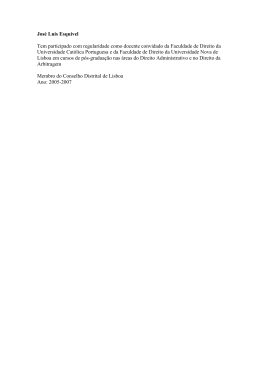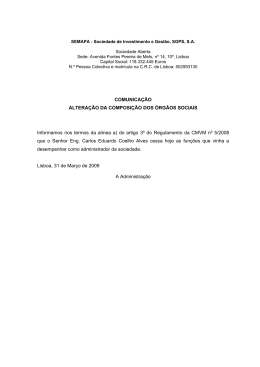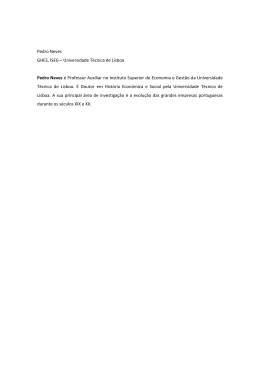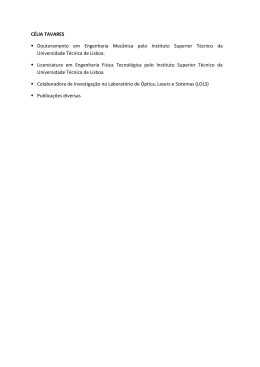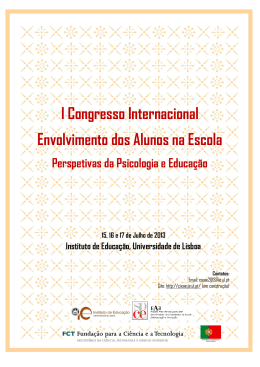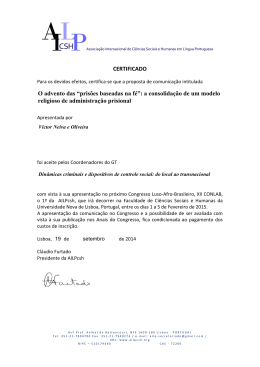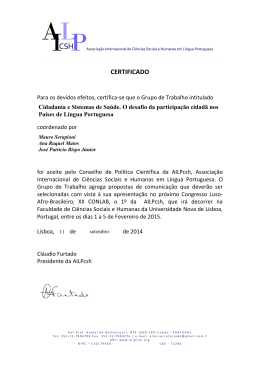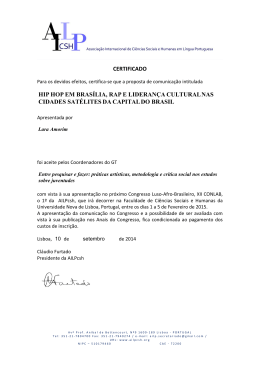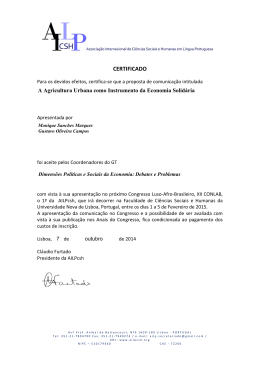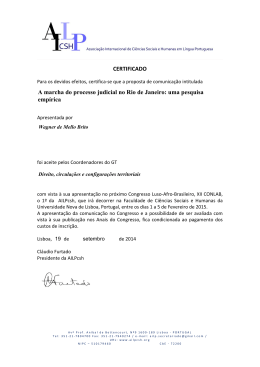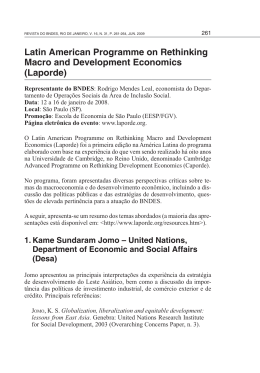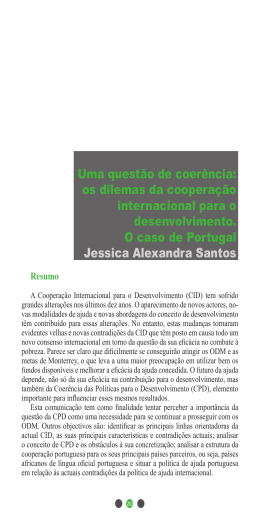SYLLABUS Programme: Occupational Therapy Title of course unit: Developmental Psychology Year:1º Semester:1º ECTS 4,5credits: CNAEF area:311 Student workload in hours Contact Total Theoretical Lectures Theoreticalpractical Lectures 40 20h 112,5 h Laboratory Classes Supervised Field Work AutonoSeminars Placements Tutorials mous 52.5h Summary Framed in the course of occupational therapy, this curriculum unit addresses relevant and fundamental aspects of development for specific occupational therapy care. With this unit is about equipping the trainees of knowledge that will enable them, in a future professional intervention, understanding and enabling the person to promote their autonomy. It is intended also to be given a special attention to the process of development throughout its life cycle (child, adolescent, adult and senescent) as well as the telltale signs of conflict or deviation from this development, thus contributing to sensitize trainees for the prevention of possible pathological experiences. Course Contents Syllabus: 1. Introduction to Psychology of Development 2. The psychological evolution of the individual: the Piagetian concepts of cognitive development; the psychodynamic conceptions about personality development; conceptions about the emotional development; conceptions about the psychomotor development; conceptions about the working lives and career development. 3. Framework of different theories over the life cycle of the person. 4. Risk factors for the development and change. Recommended or required reading Required: Blaye,A. & Lemaire,P.K. (2011). Psicologia do desenvolvimento cognitivo da criança. Lisboa: Instituto Piaget Brazelton, T. B. (2003). O grande livro da criança. O desenvolvimento emocional e do comportamento durante os primeiros anos. Lisboa : Editorial Presença Carvalhal, A. (1981). Guia para a avaliação do desenvolvimento da criança de um a doze meses de idade. Beja:SNR:Comissão coordenadora distrital de Beja do AID. Fonseca,V. (1992). Manual de Observação Psicomotora. Lisboa: Editorial Notícias. Goleman.D. (2009). Inteligência Emocional. Porto: WooK – Temas e Dabates Mata, I.(2001). Psicologia do desenvolvimento e da aprendizagem. Lisboa: Universidade Aberta. Matos, M.G. & Sampaio, D. (cords). (2009). Jovens com saúde. Diálogo com uma geração. Alfragide: Texto Editora Página 1 de 3 Oliveira,M.C.; Guimarães, V.F. & Coleta, M.F. (2006). Modelo Desenvolvimentista de Avaliação e Orientação de Carreira Proposto por Donald Super. In: Revista Brasileira de Orientação Profissional, 2006, 7 (2), pp. 11 – 18 Papalia, D. E.; Olds, S. W. ; Feldman, R. D. (2001). O Mundo da criança. Alfragide: Mc-Graw-Hill de Portugal Tran-Thong (1981) . Estádios e conceito de estádio de desenvolvimento. Ed. Afrontamento: Lisboa. Wallon, H. (1981). A evolução psicológica da criança. Lisboa: Edições 70. Recommended: Brazelton, T. B. & Greenspan, S. T. (2002). A Criança e o Seu Mundo. Requisitos essenciais para o crescimento e aprendizagem . Lisboa: Editorial Presença Chamberlain, D. (2003). A Mente do Recém-nascido. Lisboa: Gráfica Faria, M.C.S. (1991). Adolescente, família e escola. Ler Educação, 3 (pp 93-107). Fonseca,V.& Martins,R. (eds). Progressos em Psicomotricidade. Lisboa: Faculdade Motricidade Humana Montagner, H. (1900). A Vinculação. A aurora da ternura. Lisboa: Instituto Piaget Ramalho, J. P. (2003). Desenvolvimento da autonomia e da identidade nos jovens portugueses com experiência migratória. Fundação Calouste Gulbenkian: Lisboa Sprinthal,N.A.& Sprinthal, R.C. (1993) . Psicologia educacional. McGrawHill: Lisboa Santrock,J. (2003) Infancia-psicologia del desarrollo. Madrid: Mc Graw Hill Sousa, A. (2009). Avaliação do desenvolvimento da criança –dos 3 aos 10 anos – Lisboa: Livros Horizonte Neves, A.S.T. (2000). Estudo dos valores profissionais em contexto escolar. Porto: Universidade Fernando Pessoa. In: https://bdigital.ufp.pt/dspace/bitstream/10284/988/1/Monografia%20PST%20%28SPNeves%2c%202000% 29.pdf O’Toole, B.J. (2000). Guia de serviços de reabilitação de base comunitária. Lisboa: Instituto de Inovação Educacional. www site of interest and publications available http://search.ebscohost.com Missão para os cuidados de saúde primários - www.mcsp.min-saude.pt/mcsp Portal da Saúde Portugal - www.min-saude.pt/portal Portal da Saúde da EU - http://ec.europa.eu/health-eu/index_pt.htm Organização Mundial da Saúde - www.who.int/en/ Instituto Nacional de Reabilitação - www.inr.pt (possui links para as diferentes associações/organizações nacionais e intrnacionais) Rede Inclusão – www.redeinclusao.web.ua.pt UNESCO – www.unesco.org/education/inclusive Teses e Artigos Científicos - Repositório Científico de Acesso Aberto em Portugal: http://www.rcaap.pt Learning outcomes On successful completion of this course unit, the student should be able to: • Know the main theoretical development; • Knowing the size of the progression of human throughout the life cycle; • Locate the expectable behavior at each stage of development at cognitive, affective, psychomotor, emotional and social; • Understand how psychological development is interconnected with the health, welfare and quality of life; • Reflect on the impact of problems associated with situations of disability and adjustment difficulties in the development. Planned learning activities and teaching methods Theoretical presentation; Topic discussion; Video observation and discussion Página 2 de 3 Group work Contribution to the acquisition and development of specific skills Fundamental: Communicates in an efficient way to give information, counselling, instruction and opinion to co-workers, clients, their family and other care providers (interpersonal competence). Complementary: Shows knowledge and understanding of the development throughout life; Partial: Understands the influence of the social and ethical contexts in the choice and involvement in the occupations; Understands the effects of health, disability, disease processes of degeneration and injury traumatic for the person in the context of family and society. Evaluation methods and criteria Written evaluation; - 50 % Group work with oral and written presentation – 50% Página 3 de 3
Download
